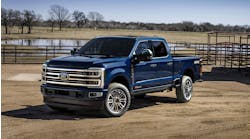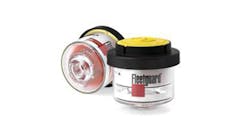The American Petroleum Institute (API), working with engine manufacturers and oil makers, is completely redesigning heavy duty engine oil specifications. Nearly a decade has passed since the last API diesel engine oil category, CJ-4, was developed.
The current CJ-4 standard has lasted well beyond the life of the typical engine category. Some of the engine tests required to qualify an oil are no longer available or no longer relevant to next-generation engines.
Oil technology and engine technology go hand in hand. Changing regulatory limits challenges engine manufacturers to reduce emissions. As engine manufacturers begin to create a new generation of cleaner, more fuel-efficient diesel engines, they need a new generation of higher-performing diesel engine oils to protect them.
EVOLUTION TO REVOLUTION
Heavy duty diesel engine designs have evolved substantially over the last 40 years. This evolution has been driven by emission legislation and customers’ requirements for efficiency and reliability.
There has been significant progress. For example:
- High pressure, common-rail injection systems are now widely used to improve combustion efficiency.
- Advances in turbocharger technology have increased specific power output.
- Exhaust gas recirculation and after-treatment devices, such as diesel particulate filters and selective catalytic reduction, have curbed harmful emissions of oxides of nitrogen and particulate matter (i.e., soot).
Despite this progress, recent regulations coupled with customers’ desires to reduce the total cost of ownership are making fuel economy the most critical driver for engine manufacturers. Advanced technologies and materials, and new operating conditions such as higher operating temperatures, continue to improve engine efficiency.
Engine changes place more stress on the oil, which has to lubricate, cool, clean and protect over long oil-drain intervals.
The vehicle industry is starting to recognize that oil can help to achieve an engine’s full potential for fuel economy without compromising hardware durability. As engine manufacturers create cleaner, more fuel-efficient diesel engines, they will need a new generation of higher-performing diesel engine oils to protect them.
DEFINE THE CATEGORY
Engines have changed considerably since CJ-4 was introduced. They have improved fuel consumption and increased power outputs.
New EPA and NHTSA emission legislation scheduled for diesel-powered commercial transport vehicles in 2017 requires significant improvements in fuel consumption that will help to reduce carbon dioxide emissions.
These fuel consumption improvements depend on vehicle class, type and size, and include specific improvements for medium and heavy duty engines. This has created the need for a new category of lubricant specifications, collectively called Proposed Category 11 (PC-11).
These oils, targeted for licensing in December 2016, will eventually replace the current CJ-4 heavy duty oils. The API will introduce two types of heavy duty diesel oil as part of PC-11:
- PC-11A (CK-4) oils will replace today’s lubricants and will be completely backwards compatible with all current vehicles. They will be designed with improved oxidation resistance, shear stability and aeration control.
The name API CK-4 is the current proposed name for the category.
- PC-11B (FA-4) oils will meet the new requirements and include lower viscosity grades designed for next-generation diesel engines to help maximize fuel economy without sacrificing engine protection. These oils will have limited backwards compatibility because some older engines were not designed to operate with lower viscosity grades.
The name API FA-4 is the current proposed name for the category. The term FA-4 will differentiate them from API CK-4 oils. The names API CK-4 and API FA-4 could still change, depending on comments from the API Lubricants Group.
These new engine oil requirements, especially for PC-11B, are a major change in the industry’s approach to heavy duty oil specifications. Oil producers will need to continue to deliver excellent wear protection and cleanliness – two factors that help drive down customers’ maintenance costs and prolong engine life.
NEW AND UPDATED TESTS
A major part of designing an oil specification is defining a set of rigorous tests that each oil formulation must pass before it goes on sale. PC-11 specifications will continue to use many of the current tests, but some of these tests will have more stringent limits.
Two new tests will be introduced to ensure that next-generation oils can cope with the oxidation stability and aeration control needs of modern technology. Both tests are designed to ensure that the new oils will be able to protect new and older engines operating under more severe conditions.
Shell Lubricants is playing a leading role in the development and testing of the next generation of low-viscosity oils through more than 20 million miles of real-world testing.
With on-highway diesel emission legislation generally leading off-highway requirements by several years, on-highway engines are generally used to develop engine tests.
However, API licensed oils are used for on- and off-highway applications. The same goes for PC-11 oils as they will be valid for transport, agriculture, construction, mining and even diesel pickup applications.
Engine manufacturers are still determining whether off-highway engines will use PC-11B oils. However, improved protection and performance can be expected even in the tough terrain and harsh conditions off-highway vehicles face on a daily basis.
THE ROAD MAP TO PC-11
Development of the new engine oil category involves a three-phase process, defined in API 1509, Engine Oil Licensing and Certification System.
Phase 1 – In this stage of the process, the API’s New Category Evaluation Team (NCET) was formed. It consists of:
- API – The only national trade association that represents all aspects of America’s oil and natural gas industry (www.api.org).
- Truck and Engine Manufacturers Association (EMA) – It represents worldwide manufacturers of internal combustion engines and on-highway medium and heavy duty trucks (www.truckandenginemanufacturers.org).
- ASTM International – A globally recognized leader in the development and delivery of voluntary consensus standards (www.astm.org).
- American Chemistry Council (ACC) – America’s oldest trade association of its kind, it represents companies engaged in the business of chemistry (www.americanchemistry.com).
The focus of the NCET, through a consensus process, is to review the request for a new oil category and evaluate the need for a new specification.
Phase 2 – This phase consists of the formation of the New Category Development Team (NCDT) to oversee the specification and test method development, and to agree any additional guidelines. (See The structure of the NCDT graphic.)
The NCDT is structured with the four functional work groups that report to the NCDT. Each of the four groups – API, EMA, ASTM and ACC – have specific responsibilities.
In addition, adhoc work groups from SAE International – a global association committed to being the ultimate knowledge source for the engineering profession (www.sae.org) – and engine test laboratories participated.
The NCDT also works through a consensus process to develop the oil category.
Once the category and the tests are defined, the first license for PC-11 will be issued. This is currently scheduled for late 2016.
Phase 3 – This stage of the development process is the category implementation.
PC-11 ENGINE OIL UPDATES
The Shell Rotella brand launched a website called WhatIsPC-11 (www.whatispc-11.com) to help educate and inform people PC-11.
The website was created the website to be a resource for topics such as the fundamentals of PC-11, impending changes, testing updates and how it is expected to affect new, current and older engines when the category replaces API CJ-4 engine oils by 2017.
The website was created to be a resource for topics such as the fundamentals of PC-11, impending changes, testing updates and how it is expected to affect new, current and older engines when the category replaces API CJ-4 engine oils by 2017.
Dan Arcy is the chair of the New Category Development Team at the American Petroleum Institute (API) and the global OEM technical manager for Shell Lubricants. API (www.api.org) is the only national trade association that represents all aspects of America’s oil and natural gas industry. Shell Lubricants (www.shell.us) manufactures and blends products for use in consumer, heavy industrial and commercial transport applications under a range of brands, including Shell, Shell Rotella, Pennzoil, Quaker State and Jiffy Lube.



